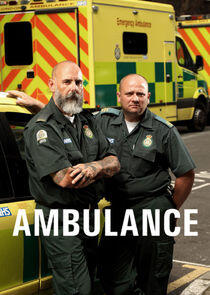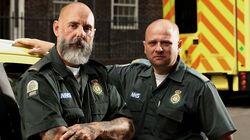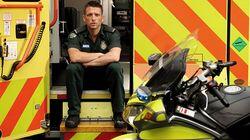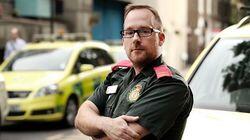Ambulance - Season 1

Season 1
London
Insight into the London Ambulance Service, providing a snapshot of the daily pressures.

Episodes

The Day Shift
An ordinary day for the London Ambulance Service means dozens of car crashes, overdoses, suicide attempts and - statistically - 28 cardiac arrests, where every second can make the difference between life and death.
By 11am, seven cardiac arrests have come in, and now there are two more people fighting for their lives. As one crew battles through London traffic, knowing seconds and minutes can affect the outcome of a dad of two's heart attack, across the city another crew face a difficult decision - whether to stop resuscitation of their patient knowing full-well the impact it will have on the family.
The brain of the ambulance service is the control room, and when a number of stabbings, suicide attempts and a double shooting flood the 999 phone lines simultaneously, they threaten to overwhelm the service. A highly-skilled Advanced Paramedic has barely finished with a double shooting before he's called to a man who has fallen from a sky scraper. In the control room they're running short of ambulances and they know the next call could be a major incident needing dozens of crews.
When there's an unexpected spike in 999 calls far outstripping the number of ambulances available, drastic action has to be taken, and some emergency callers have to be told the ambulance can't come to them while the service prioritise reaching those in most urgent need who maybe fighting for their lives. Multiple calls about an explosion in a flat come in, heralding their worst fear, and the whole of the London Ambulance Service now has to step up.

The Night Shift
The second episode joins staff in the nerve centre of the operation during the night shift. Among the thousands of desperate calls for help they receive, they also have to contend with hoaxers, frequent callers and run-away patients.
It's a busy shift with, at one point, 125 patients waiting for assistance, meaning that the ambulance allocators have to prioritise the sickest patients first, even if that means bumping others down the queue.
One of those waiting is an elderly 'faller' who's been on the floor for three hours. An ambulance crew are on their way to him when, at the last moment, they are diverted to what seems to be a more pressing emergency. A woman says she is having a miscarriage and so he's left to wait even longer. But when they reach her, they discover all is not as first seemed. When she calls again for the same emergency a short while later, they're torn between frustration and compassion for someone who's clearly troubled.
Meanwhile, another crew assist a 94 year-old who has fallen, and who entertains them with surprisingly candid talk of her love life. Her condition deteriorates as they treat her and the decision is made to take her into hospital. The crew are all too aware that this may be the last time she leaves home.
Across the city, a call handler spends an hour and a half on the phone to a suicidal patient who is running away from those trying to come to his aid, in one of the most logistically challenging cities in the world. But whilst one patient is resistant to help, another is all too desperate for an ambulance. A dementia-sufferer has called more than 15 times wanting an ambulance, and even after visits by paramedics and a district nurse who agreed she didn't need their medical assistance, she continues to call. If they keep sending ambulances to her, there'll be fewer for other patients in the area, so the service faces a difficult decision to say no to her pleas for help.

The Weekend Shift
Tonight the London Ambulance Service braces itself for a demanding weekend shift. As Londoners head out to play, the Ambulance Service often has to pick up the pieces and prepare for a torrent of cases, all with their own unique challenges.
In Brixton, Advanced Paramedic Rich helps a man who's out of control and lashing out in a nightclub after taking a drugs overdose. The control centre is under pressure as five babies are being delivered by the call handlers over the phone tonight.
By Saturday night the streets of London are a huge challenge for the service: as the pubs begin to close, the violence escalates. The ambulance dispatchers are forced to make tough calls about who gets an ambulance quickest and who will have to endure a long wait - when a call about a stabbing comes in they have make the difficult decision to divert a crew from a six year-old who has fallen from a bunk bed. A couple of hours later, the same crew attend their second stabbing of the evening; it's the seventh across London that night.
Stabbings fuelled by drugs or alcohol are becoming an increasing feature for the weekend shift, but sometimes the most urgent calls are more straightforward than the social care ones; a man who has left hospital without being discharged needs returning to have his cannula removed. Homeless and wanting a sandwich, the crew debate whether it's their job to offer him the support he wants. They know there are always other pressing emergencies they could be attending.
Later the control centre has the tough job of telling a frequent caller who desperately wants to go to hospital that they won't be taking him as he's not sick enough to get emergency care, even though he does need support. As many care services in the capital aren't available all hours, the ambulance service end up being asked to pick up the pieces.
When at the end of the weekend a call about a miscarriage comes in, it's the type of emergency that the ambulance staff are trained for, but all the preparation in the world can't always shield them from the emotional toll sharing a personal tragedy can have.
Recently Updated Shows

NCIS
NCIS (Naval Criminal Investigative Service) is more than just an action drama. With liberal doses of humor, it's a show that focuses on the sometimes complex and always amusing dynamics of a team forced to work together in high-stress situations. Leroy Jethro Gibbs, a former Marine gunnery sergeant, whose skills as an investigator are unmatched, leads this troupe of colorful personalities. Rounding out the team are Anthony DiNozzo, an ex-homicide detective whose instincts in the field are unparalleled and whose quick wit and humorous take on life make him a team favorite; the youthful and energetic forensic specialist Abby Sciuto, a talented scientist whose sharp mind matches her Goth style and eclectic tastes; Caitlin Todd, an ex-Secret Service Agent; and Timothy McGee, an MIT graduate whose brilliance with computers far overshadows his insecurities in the field; Assisting the team is medical examiner Dr. Donald "Ducky" Mallard, who knows it all because he's seen it all, and he's not afraid to let you know. From murder and espionage to terrorism and stolen submarines, these special agents travel the globe to investigate all crimes with Navy or Marine Corps ties.

Landman
Set in the proverbial boomtowns of West Texas, Landman is a modern day tale of fortune seeking in the world of oil rigs. The series is an upstairs/downstairs story of roughnecks and wildcat billionaires fueling a boom so big, it's reshaping our climate, our economy and our geopolitics.

The Creep Tapes
Based on a collection of videotapes in the secret vault of the world's deadliest and most socially uncomfortable serial killer, who hires his victims to film him for the day under false pretenses, each episode exposes a new victim from one of the fabled 'Creep Tapes'.

America's Funniest Home Videos
ABC's longest-running primetime entertainment show, America's Funniest Home Videos, returns for season 36 this fall with the same mission -- giving families something genuinely funny to enjoy together on Sunday nights.
"AFV," the longest-running primetime entertainment show in ABC history, returns for season 36 with the same mission - to provide viewers with hysterical moments that fly by at a dizzying pace.

The Real Housewives of Potomac
Just up the river from our nation's capital lies a hidden gem—Potomac, Maryland. Its rolling hills, gated mansions, sophisticated prep schools, and exclusive country clubs all serve to keep the area invitation-only. Sprinkled throughout this community are a handful of old-line, wealthy African-American families who have historically broken racial barriers to provide a life of privilege for their children. The Real Housewives of Potomac follows the upscale lives of six intriguing, well-to-do women: Gizelle Bryant, Katie Rost, Karen Huger, Charrisse Jackson-Jordan, Robyn Dixon, and Ashley Darby, all of whom have fought for their places in this society by way of legacy or marriage. In a town where entry is granted only through class, pedigree, and lineage, how far will these ladies go to secure their spot at the top of this prestigious circle?